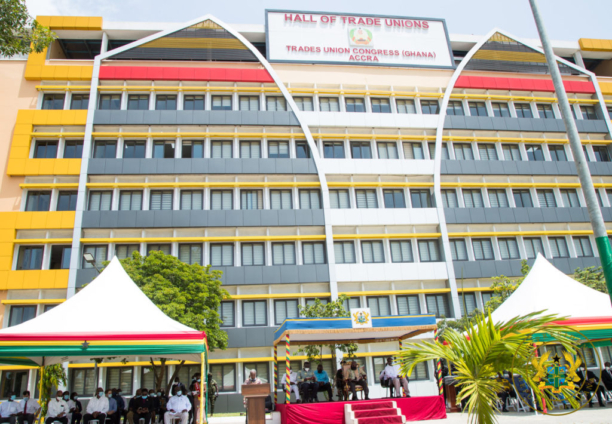The Trades Union Congress (TUC) says the government has yet to officially communicate any withdrawal or include it in discussions about introducing a 15% Value Added Tax (VAT) on electricity use.
To that end, the Union’s scheduled strike on February 14, 2024, remains in effect, according to Mr Joshua Ansah, Deputy Secretary General of the TUC, who spoke with the Ghana News Agency on Wednesday.
“As at the time I’m talking to you [Wednesday afternoon], we’ve not received any official communication from the government with respect to the withdrawal of the 15 per cent VAT on electricity consumption.
“This implies that, if we don’t receive any official communication of the withdrawal, our intended action will come on as planned,” he said.
Mr Ansah urged the government to look into other revenue mobilisation mechanisms, rather than taxation, which he said often impacted individuals and businesses in the country.
“For us, we believe that government has a lot of options, instead of taxing businesses and workers. Tax is the easiest and fastest way to get revenue, but it burdens your citizens,” he explained.
Mr Ansah suggested that the government implement effective policies to plug loopholes in public spending, create smarter and friendlier revenue-collecting structures, and review tax exemption regimes.
“Many people are doing businesses in this country and are not paying taxes. If we bring all of them into the tax net, we will generate enough revenue, and that should be the focus of the government.
“If we’re able to do these effectively, and government looks at its expenditure critically, there will not be any need for us to even go to the International Monetary Fund (IMF),” the TUC Deputy Secretary General said.
The Ministry of Finance had instructed the Electricity Company of Ghana (ECG) and Northern Electricity Distribution Company (NEDCO)) to begin implementing a 15 per cent VAT on power consumption from January 1, 2024.
The tax was to be levied on residential customers who used more electricity than the maximum level allowed for block charges for lifeline units.
According to the Ministry, the directive was in line with Sections 35 and 37, and the First Schedule (9) of the Value Added Tax (VAT) Act, 2013 (Act 870).
The TUC pointed out that the policy was part of the government’s Medium-Term Revenue Strategy and the IMF-Supported Post-Covid-19 Programme for Economic Growth (PC-PEG).
It however condemned the decision, stating, “Our message to the government is very simple – we cannot pay VAT on electricity,” and demanded that the tax be dropped immediately.
Following considerable agitation, the Ministry of Finance announced on January 30 that the government would have “extensive dialogue” with Organised Labour and other key stakeholders in the following weeks to ensure buy-in for the introduction of a 15 per cent electricity VAT.
Latest Stories
-
Black Stars could miss key players for 2025 Unity Cup – Dr Randy Abbey
3 hours -
Pyramids grab late equaliser in African Champions League final
4 hours -
EU calls for ‘respect’ after Trump threatens 50% tariffs
4 hours -
Ronaldo ‘could play’ in Club World Cup – Infantino
4 hours -
Amorim tells Garnacho he can leave Man Utd
4 hours -
Djokovic makes more history with 100th singles title
4 hours -
Ten Hag set to replace Alonso as Leverkusen manager
4 hours -
Salis’ Sunderland secure Premier League return
4 hours -
Assin Fosu chiefs and elders bless TGMA Unsung Artiste of The Year, Yaw Darling
5 hours -
Middle-aged, 2 children trapped in their home after a fig tree sealed their frontage doors
6 hours -
Roots of resistance: The climate cost of cutting Accra’s trees
6 hours -
Reimagining Informality: Harnessing the Urban potential of street vending in Ghana
6 hours -
Former Yendi MP Dr Farouk Mahama donates towards funeral of late Mion chief
6 hours -
Ghana Gas board pledges accountability and staff support during operational tour
7 hours -
Burkina Faso’s uprising is a rebirth, not rebellion – Ras Mubarak
7 hours

